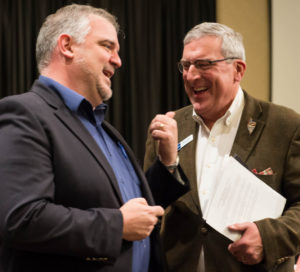Martin Carcasson, professor of Communication Studies and director of the Center for Public Deliberation, is a member of the Provost’s Council for Engagement. He discusses why he became involved with the council, what he hopes to accomplish, and how engagement filters to his students.

What, in your opinion, is “faculty engagement”?
“I’ve had the benefit that my work inherently brings together teaching, research, and service, so ‘engagement’ is not a separate category or something I make time for, it is essentially what I do. I believe collaborative problem solving can serve well as an overarching concept that brings together many different aspects of what communities need and universities can help support. That includes research, exploration, conversation, decision-making, creativity and innovation, collaborative action, assessment, etc. Universities have capacities in all these areas, but too often those capacities are disconnected. Engagement works to bring them all together with a systemic lens.”
How has your program or students benefited from what you have learned as an engaged faculty member? And, has there been reciprocity with the communities outside of CSU that you have been involved with?
“I believe my students have benefited greatly from the hands-on nature of the CPD’s work in our community. They have honed critical skills that are paramount to address 21st century challenges. And, yes, I consider the CPD an ongoing experiment learning about the role of an institution like the CPD in a local community. We are constantly learning about our role, and how we can best negotiate the inherent tensions to serving as an impartial resource that nonetheless prioritizes broad inclusion and quality data.”
Why are you involved with the Council and how does it relate to your work or research?
“I’m involved with the council because I believe strongly in the potential impact of a university on a local community and state. I believe what our communities need most is increased capacity for collaborative problem solving, and universities are best situated to provide that capacity. Thankfully, I also believe when universities re-imagine their role as focusing on building capacity for high quality collaborative problem solving, they are in many ways at their best.
“Universities cannot simply focus on producing new knowledge when the political environment is so polarized and dysfunctional that knowledge is simply used or ignored to fit preexisting assumptions. Universities must address the quality of our public discourse in order to ensure that the knowledge being created or discovered is actually utilized well. Data is not enough to solve problems (it is necessary, but not sufficient). We need quality engagement with that data, and that doesn’t happen naturally. Universities, however, have the resources and the mission to be able to help their communities elevate the quality of public discourse.
“I’m also involved because I want to continue to grow the Center for Public Deliberation as a resource and a connector, so the more I know others on campus that are focused on making a local impact, the more we can help each other multiply that impact.”
Here is a short article on the role of centers like the CPD in their communities
What do you hope the Council is able to accomplish?
“I truly believe CSU can be a model for the nation in authentic, impactful engagement, particularly in terms of local impact. Both Fort Collins and Larimer County are innovative in their public engagement, and the city is a very engaged city in terms of nonprofits and community leaders. There is new attention on ‘university cities’ as unique cities that can best take advantage of the ‘triple helix’ of a major university, industry, and city government. This council, particularly considering the mayor is a part of it, could certainly be a catalyst to great things that other universities will look to emulate.”